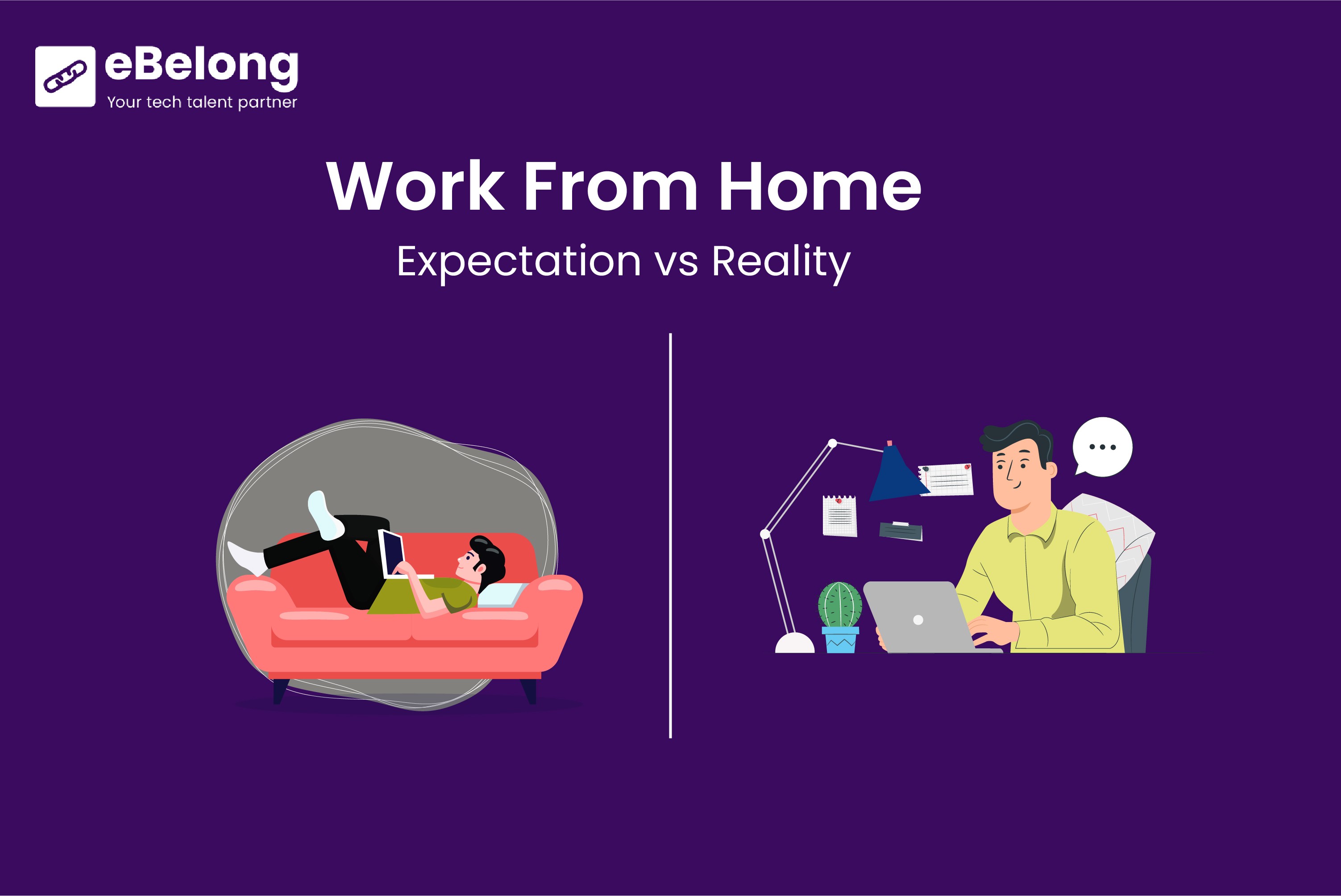Work From Home: Expectations Vs Reality
Even though it is not a new concept but it has surely become a popular one ever since the pandemic hit us. Yes, we are talking about remote work aka “Work From Home”.
It started on as a forced alternative to shutting down of workplaces but quickly gained a major fan following especially among the millennials who adored the idea of working from their mushy beds wearing their comfy PJs and avoiding nasty 7 am traffic jams.
But is it all bed of roses? Or are there buzz killers too? Let us burst the 5 major unrealistic expectations bubble with a bit of reality check.
1. WFH is all about PJs and chill
Many of us think working from home is great news. Your supervisor isn't present, you don't have a schedule, and the best part is that you don't have to deal with any irritating employees! Want to watch your favorite Netflix show again? of course! And if no one is looking, why not dress in your jammies to level things up? Particularly on the days when you sleep in till a late hour and feel rushed to get dressed and take a shower.
Working remotely necessitates a lot of discipline, which is the uncomfortable truth. To get things done, just like at the office, you must organize yourself. So even if you could watch Netflix and lounge around the house all day if you want, you know that this is not practical and will not get the work done.
When the pandemic first began, many people were eager to work in their comfortable PJs. Many Instagram and Twitter memes included people working in their PJs and then rapidly changing for Zoom meetings, pretty much as quickly as Peter Parker changes into Spider-Man. The truth is dressing properly for work affects how productive we are. According to psychologists, dressing in work clothing can help ensure that you will perform your duties as though you were at the office since it alters your attention, pace, and mood.
2. WFH means bliss of solitude
You won't see your coworkers as much if you work from home. No more Friday beer or coffee breaks! This implies that you won't be conversing with anyone and that you might eventually feel depressed and uninspired.
One of the most widespread myths is that working remotely makes people more lonely. That's not crazy to presume it based on a cursory analysis of the situation. The fact that you are working remotely, whether from your home or another location, means that you are not surrounded by your coworkers. Sadly, the epidemic effectively isolated the majority of us, demonstrating that for some remote employees, loneliness is a real problem.
In Buffer's 2020 State of Remote Work poll, 20% of participants identified loneliness as their greatest challenge when working remotely.
Many remote workers consider loneliness to be their major challenge, yet many others have found it to be the exact opposite. Isolation and loneliness are largely influenced by the organization you work for and its culture. You won't likely feel lonely if you work in a remote company that values its workers' well-being and encourages collaboration.
3. Virtual culture is more fun
Ping pong tables, nap pods, Friday happy hours, and birthday celebrations are all big parts of the workplace culture. How will that all be accomplished while working remotely? If teams can't see each other's faces, how can they work together? Is it feasible to create a business culture when your team members feel so distant?
The term "business culture" covers a wide range of interpretations. Teamwork signifies culture to some people. For some, that entails spending every waking hour with coworkers. People are the one element that all definitions have in common overall. People are the center of a company's culture, as is building cohesive teams.
There are numerous things at risk if the corporate culture is absent. And for those leaders who believe that culture necessitates people being together frequently, remote work might be difficult.
DistantJob's founder and president, Sharon Koifman, emphasizes that culture is about engaging with your coworkers rather than being constantly surrounded by them.
Working remotely doesn't preclude culture. It changes how culture is defined, forcing executives to place greater emphasis on their relationships with their workforce. All team members must exert greater effort as well. Not all is lost, you can still build a culture in your virtual team by holding regular get-togethers, virtual coffee meetings, and using other methods of getting to know one another.
4. WFH means no schedule to follow
Being in control of your own schedule is one of the best aspects of working remotely. You can work when you want and do anything you want. It doesn't matter if you overslept and woke up at 10 a.m. because you don't have to get ready for work. It's not a big deal if you just brew a cup of coffee and get to work later than normal.
You're mistaken if you believe that working remotely gives you complete control over your schedule and allows you to do whatever you want. You still have to submit reports, deliver outcomes, and complete your work. Even if you might take power naps after lunch and shower during your morning breaks, you still have objectives to reach and conferences to attend just like you would in a traditional company. If not, you will conclude with a report.
Even if this isn't the case for you, it's still strongly advised that you maintain a schedule. Many businesses demand remote employees be online during specific times of the day, either for conferences or for particular responsibilities, doesn't matter if you are a remote developer or a performance marketeer You'll be more productive, have better concentration, and know when to quit working as a result of this.
Overworking is one of the main problems that remote workers have. Nearly 70% of employees who started working remotely due to the covid 19 pandemic say they now work on weekends too, and 45% say they put in more hours than they did when they were at the office, according to a Robert Half survey of 2,800 remote workers. You may prevent overworking yourself and achieve a better work-life balance by following a rigid routine that doesn't center around your computer.
5. WFH is working from your dream destination
You have independence when you work from home. You are free to choose where you want to work: at home, in a nearby coffee shop, in a coworking space, or on a beach in Hawaii. You get to travel anywhere just like those digital nomads working on their laptops in lush green valleys while sipping a pina colada. The ideal life, no?
You definitely have freedom when you work remotely. Your dependence on working in an office has ended. Some people find it to be the best thing ever since it allows them to design a workplace that maximizes their performance. This is why the majority of remote workers do their job at home or in coworking spaces, where they can concentrate better.
And although you can work from the beach, there are actually a lot of considerations when adopting the digital nomad lifestyle. Along with taking into account factors like WI-FI, you need to be certain that you will be able to complete your work in those far-off locations.
Conclusion
Both working from home or going to the office have their fair share of pros and cons. What might boost the productivity of one person can bring the other’s down. Hence what’s beneficial for one person might not be for the other. It all depends from person to person. Therefore, If you have a choice choose the one that suits you the most.


